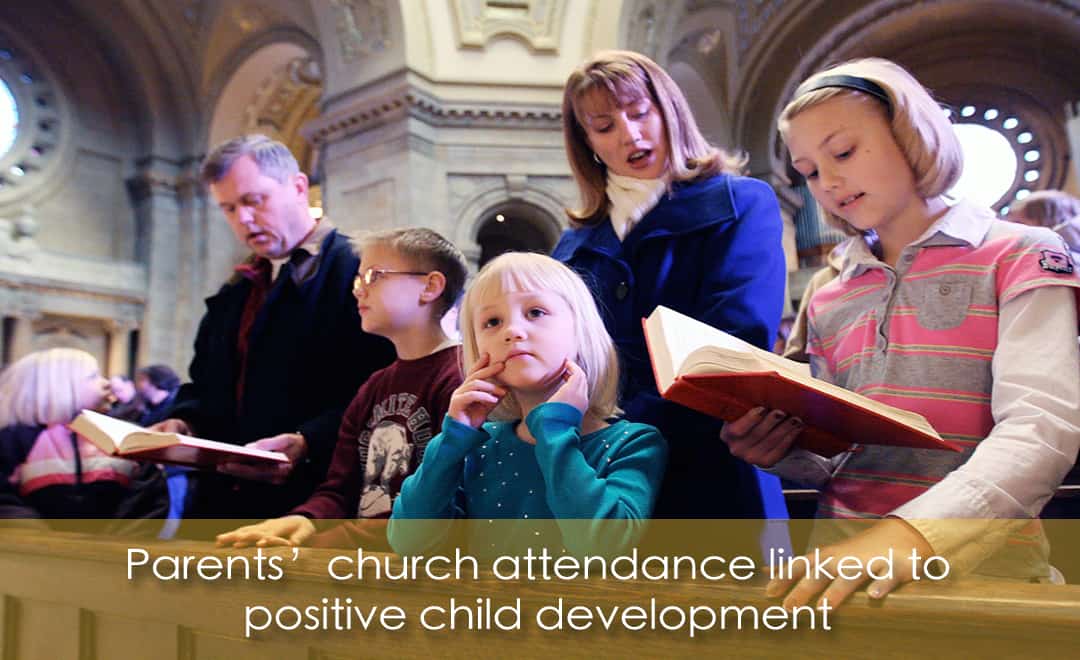文章摘要學習:
Among several aspects of parental religiosity, church attendance exerts a consistent and positive effect on five measures of child development. The more that a child’s mother or father participates in public worship on a weekly basis, the higher the rating of a child’s eagerness to learn, variety of interests, creativity, persistence, and responsibility.
在父母的宗教信仰觀點方面,出席教會在小孩的發展上發揮了五個持續並正面的影響。父母越多參與在每週的固定聚會,小孩的以下發展越好:
- eagerness to learn 學習的渴望
- variety of interests 興趣的多樣性
- creativity 創造力
- persistence 持續力
- responsibility 責任感
——全文——
美國社會學專家日前公布一項研究,指出父母親擁有虔誠信仰,並且固定上教堂禮拜,對其小孩具有正面影響,而另一份研究也指出,具有宗教信仰的小孩其學業表現也優於其他無宗教信仰小孩。
社會學專家指出,根據研究,父母篤信宗教,並且固定帶小孩上教堂,有助於兒童正面發展。專家表示,兒童會從父母及老師身上學習其行為及觀念。而父母有固定上教堂習慣者,其小孩也會更有創造力、責任感及專注力。而固定參加教堂聚會的父母,也代表其擁有較高的自我控制力,連帶著小孩也會受其影響,另一方面,因小孩常出席聚會活動,使得他們擁有較佳的社交能力,比較容易與其他小朋友建立良好的人際關係。而另外,研究也指出,具有宗教信仰的父母,比較會為小孩未來做規劃,而時常參加教會活動的兒童,長大後有較高的解決問題能力,而由於常與父母親一同活動,家人凝聚力也較佳。而宗教團體強大的社會資源,可讓收入水平較低家庭之兒童,擁有較佳的學習榜樣,以及獲得更好的學習資源。
而另一項研究也指出,擁有虔誠宗教信仰的人在學業表現方面較優。根據調查,時常參加宗教聚會的小孩在數學及閱讀方面的能力比無宗教信仰之小孩表現較佳、而其在上大學後,會更努力於課業研究上,因此平均學業表現也較好。另外,擁有宗教信仰的學童其上課出席率普遍表現優良,而且輟學率較其他學生低。
雖然之前有報導指出,宗教信仰與道德並無必然關係。不過綜合以上調查,擁有宗教信仰,似乎對學童好處多多。如本身已為基督徒的父母,記得假日,多多帶著您的小孩參加教堂聚會活動喔。(吳雯淇/綜合外電報導)
全文轉自Kairos風向新聞
原文全文:連結
Parents’ church attendance linked to positive child development
Church attendance exerts a consistent and positive effect on five measures of child development.
“A bipartisan group of state lawmakers on Tuesday unveiled a plan to expand access to early learning programs for Minnesota’s neediest children,” according to the Twin Cities Pioneer Press, though the plan may not have enough steam to move ahead.
“A Better Chance”—or ABC Act—would make preschool scholarships, for birth through age five, available to more of the state’s at-risk children. The legislation would also fund the Parent Aware Rating System, which is used to help decide if early-learning programs should be eligible for state scholarships, and expand “home-visiting programs providing support for low-income families and the health and development needs of their children.”
All laudable goals, to be sure, but research indicates that there is much, much more to early childhood education than the number of state-funded programs available.
The New Research — Better than preschool
For at least a generation, policy elites have considered “early education”—a euphemism for more institutional daycare and nursery schools—the Rosetta stone that unlocks the mysteries of the healthy development of young children. Yet a study by researchers at Mississippi State University, finding “robust and quite clear” links between parental church attendance and several measures of child development, suggests that the well being of children depends more on parents than on parental substitutes.
Crunching data on more than 21,000 children enrolled in kindergarten and first grade from the spring 2000 wave of Early Childhood Longitudinal Study-Kindergarten Class, the sociologists discovered that Aamong several aspects of parental religiosity, church attendance exerts a consistent and positive effect on five measures of child development. father’s and a mother’s church attendance, they found, each strongly correlated with a child’s “approach to learning” as evaluated by parents and by teachers (p<.001 for all four coefficients). In other words, the more that a child’s mother or father participates in public worship on a weekly basis, the higher the rating of a child’s eagerness to learn, variety of interests, creativity, persistence, and responsibility.
Each of these two church attendance variables was also strongly linked to evaluations of child self-control by parents and teachers (p<.001 for three coefficients, p<.05 for one), to the evaluation of a child’s social interaction by parents (p<.01 for both), and the evaluation of a child’s interpersonal skills by teachers (p<.001 for mother’s attendance, p<.05 for father’s). In addition, the two independent variables yielded numerous, although not all, statistically significant correlations with scales measuring child sadness/loneliness and impulsiveness/overactiveness.
A third variable, “both parents attend [church] frequently,” was statistically associated with all five measures of child development as rated by parents and teachers (p<.05 for nine coefficients; p<.10 for one).
Explaining their findings, the researchers emphasize the “multiplicative effect” of parental church attendance on the well being of children: “It is not simply generic homogamy (couple similarity regardless of religiosity), but rather the amount of religion (e.g., stocks of ‘religious capital’) that a couple can jointly import into the family that bolsters child outcomes, especially for child performance outside the home.” Given how much policymakers are looking for ways to boost the “school readiness” of children, these findings point to an overlooked and often ignored means to that end.
(Source: Bryce J. Christensen and Robert W. Patterson, “New Research,” The Family in America 24.2 [Spring 2010]. Study: John P. Bartkowski et al., “Religion and Child Development: Evidence from the Early Childhood Longitudinal Study,” 37.1 Social Science Research [2008]: 18–36.)
This article has been republished with permission from The Family in America, a publication of The Howard Center. The Howard Center is a MercatorNet partner site.



